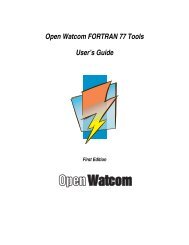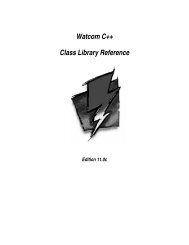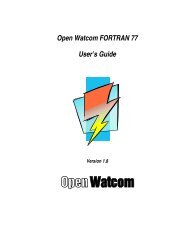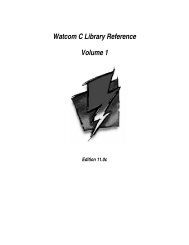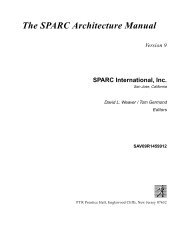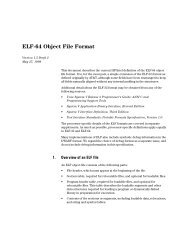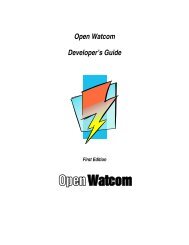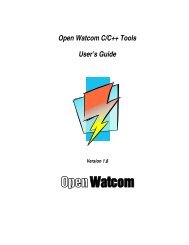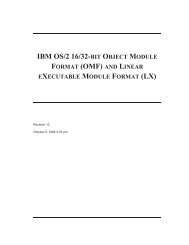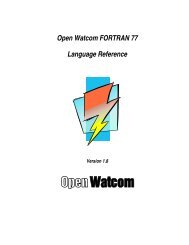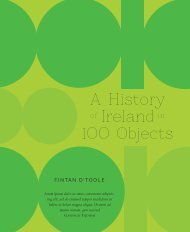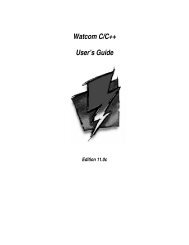Relocatable Object Module Format (OMF) Specification
Relocatable Object Module Format (OMF) Specification
Relocatable Object Module Format (OMF) Specification
You also want an ePaper? Increase the reach of your titles
YUMPU automatically turns print PDFs into web optimized ePapers that Google loves.
<strong>Relocatable</strong> <strong>Object</strong> <strong>Module</strong> <strong>Format</strong><br />
The values that have been defined (including obsolete values) are the following:<br />
0 Translator Translator; it may name the source language or translator.<br />
We recommend that the translator name and version, plus<br />
the optimization level used for compilation, be recorded<br />
here. Other compiler or assembler options can be<br />
included, although current practice seems to be to place<br />
these under comment class 9D.<br />
1 Intel copyright Ignored.<br />
2 – 9B Intel reserved These values are reserved for Intel products. Values from<br />
9C through FF are ignored by Intel products.<br />
81 Library specifier—<br />
obsolete<br />
9C MS-DOS version—<br />
obsolete<br />
Replaced by comment class 9F; contents are identical to<br />
9F.<br />
The commentary byte string field is a 2 byte string that<br />
specifies the MS-DOS version number. This comment<br />
class is not supported by Microsoft LINK.<br />
9D Memory model This information is currently generated by the Microsoft C<br />
compiler for use by the XENIX linker; it is ignored by the<br />
MS-DOS and OS/2 versions of Microsoft LINK. The byte<br />
string consists of from one to three ASCII characters and<br />
indicates the following:<br />
0, 1, 2, or 3 8086, 80186, 80286, or 80386<br />
instructions generated, respectively<br />
O<br />
Optimization performed on code<br />
s, m, c, l, or h Small, medium, compact, large, or<br />
huge model<br />
A, B, C, D 68000, 68010, 68020, or 68030<br />
instructions generated, respectively<br />
9E DOSSEG Sets Microsoft LINK's DOSSEG switch. The byte string is<br />
null. This record is included in the startup module in each<br />
language library. It directs the linker to use the<br />
standardized segment ordering, according to the naming<br />
conventions documented with MS-DOS, OS/2, and<br />
accompanying language products.<br />
9F<br />
Default library<br />
search name<br />
The byte string contains a library filename (without a lead<br />
count byte and without an extension), which is searched in<br />
order to resolve external references within the object<br />
module. The default library search can be overridden with<br />
LINK's /NODEFAULTLIBRARYSEARCH switch.<br />
10 <strong>OMF</strong> <strong>Specification</strong>, Version 1.1 Tool Interface Standards (TIS)




